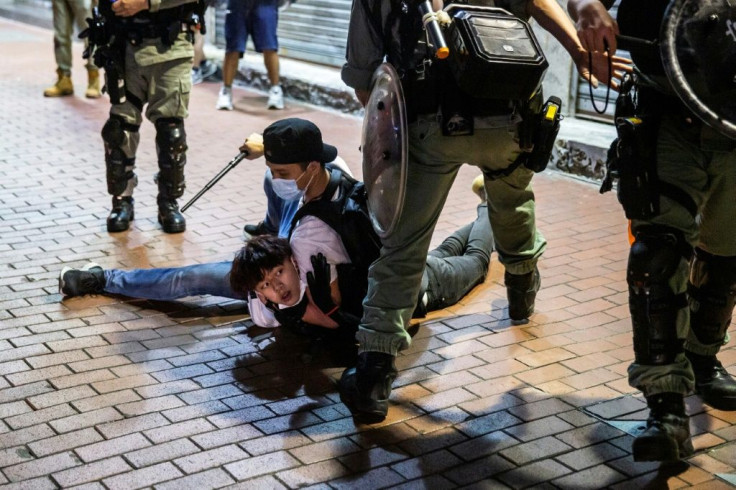Child Reporter or Child Labor? Hong Kong Police Detain 12-Year-Old Boy Covering Protests
KEY POINTS
- A 12-year-old boy who identified himself as a student journalist was detained during protests
- He was accused by an officer of taking part in “illegal child labor”
- The boy was a volunteer reporter for a student-run news organization called Student Depth Media
One of the biggest news stories in 2019 was the often-violent anti-government protests in Hong Kong that shut down the city’s transportation systems, airlines, and businesses for a short time. The protests have been overshadowed by COVID-19, but they are still ongoing as the former British Colony emerges from the pandemic.
The story from Sunday’s anti-government protest is the detention of a 12-year-old boy who identified himself as a student journalist. This has raised some concerns by the police, lawmakers, and other journalists about child labor, journalist accreditation, and the safety of children who find themselves in adult roles.
The protest took place at Harbour City mall in Tsim Sha Tsui, a shopping and nightlife district in Kowloon. The boy reporter was wearing a fluorescent vest that bore the word “PRESS” on it. He was accused by an officer of taking part in “illegal child labor” and taken to a nearby police station where he remained until the evening.
No charges were brought up against the boy, but, according to his mother, she was warned she could be prosecuted for failing to protect him if he were seen at future protests. The boy was a volunteer reporter for a recently formed student-run news organization called Student Depth Media.
Several such student-run online media platforms started during the anti-government movement that began in June of last year. This has resulted in young and largely untrained reporters standing alongside experienced older journalists from traditional media outlets.
The protests have pitted pro-democracy sentiments against the police and government viewed as being pro-Chinese under the watchful eye of Beijing and with members of the People’s Liberation Army (PLA) stationed nearby waiting to be deployed any time.
Opinions over journalist accreditation as a safeguard against minors reporting in dangerous situations seems to be influenced by whose side one is on. The mostly pro-democracy social media has encouraged the lad for his determination to be a front-line reporter at such a young age. Other opinions by educators and journalists vary.
A former journalist and pro-Beijing lawmaker Priscilla Leung Mei-fun is for the government to establish an official press accreditation system, saying children were putting their safety at risk reporting from protest venues. She also said an accreditation system would prevent the practice of people from disguising themselves as reporters.
Other journalists disagree. Chris Yeung Kin-hing, the chairman of the Hong Kong Journalists Association said, “We shouldn’t label student reporters as a problem.” He pointed out in the U.S., no accreditation was required except in specific locations like the White House.
A former protester and once a teenage reporter at age 16, Wilson Li Chung-chak, who is now a 23-year-old City University student said he knew how to stay safe at such demonstrations. But he also agreed a 12-year-old covering potentially violent protests could be dangerous.
He said, “If you’re just 12 years old, can you react fast enough when it gets dangerous? I wouldn’t encourage students that young to cover these events.”
There is currently no law in Hong Kong to stop anyone from capturing video imagery and audio with a smartphone to make a report in a public place.

© Copyright IBTimes 2025. All rights reserved.





















